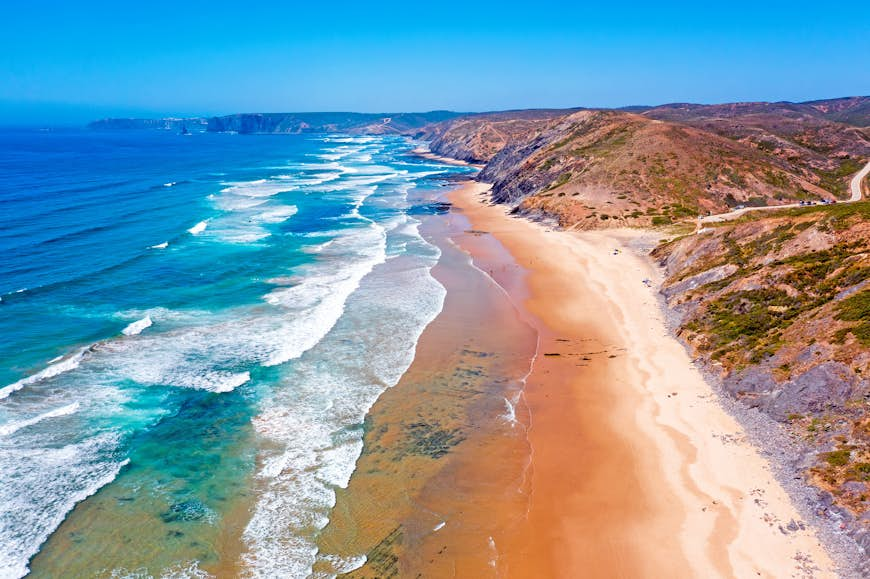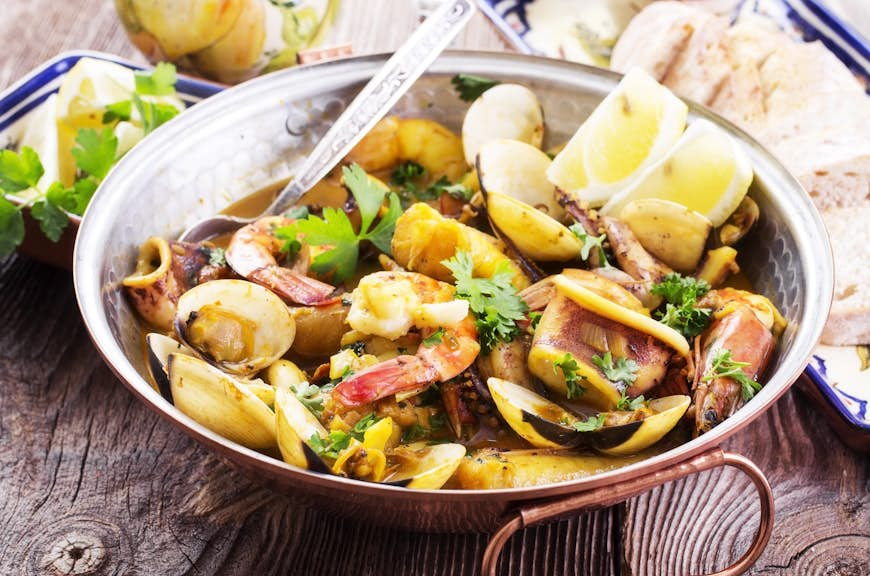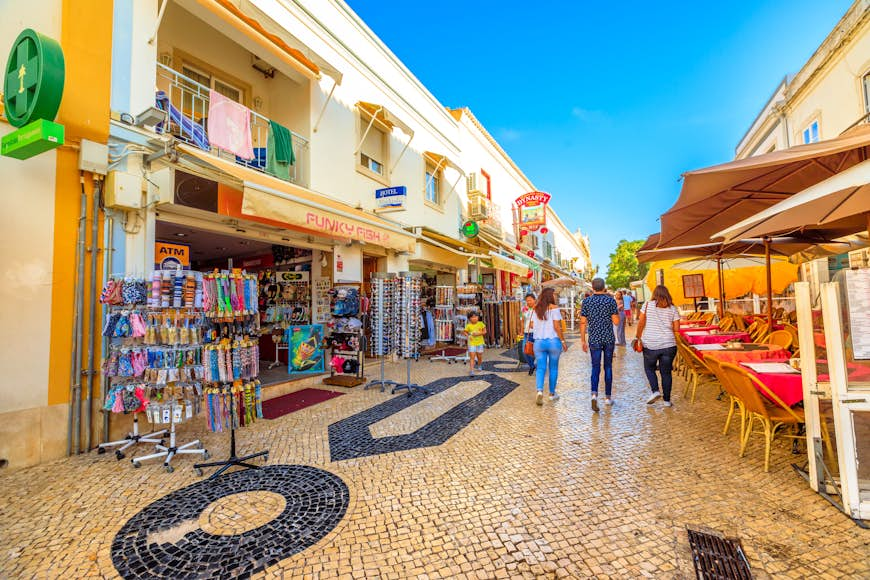Anchoring the south of Portugal, the Algarve is famous for its cliff-backed beaches, mouthwatering seafood and picturesque villages. It’s also a remarkably easy-going region, with a welcoming vibe for every kind of traveler.
While it’s easy to hop on a plane and jet down for a spontaneous week (or weekend), you can make more out of your trip with a bit of preparation and by learning a few cultural tidbits before you arrive. Here are a few of our top tips for a rewarding visit to the Algarve.
Decide where to stay
The Algarve has many facets, so figuring out where to overnight depends on how you plan to spend your days in this sun-drenched corner of Portugal. For aquatic activities and abundant nightlife, vibrant Lagos earns high marks for its wide-ranging appeal. If you’re here solely to party and lie on the beach, Albufeira has you covered. For a quieter getaway near pretty beaches, consider Ferragudo, a former fishing village with loads of character.
Though not on the beach, the historic town of Tavira lies within a ferry ride of a pretty sand-covered island. On the west coast, Sagres has an end-of-the-world feel with lofty views from its towering sea cliffs. The northwest of the Algarve has charming villages like Carrapeteira, set on highlands overlooking wild beaches, and has some excellent surf camps.
After you decide where to go, book well in advance
The Algarve’s growing popularity means some of the best places to stay get booked up months in advance. This is especially true if you’re traveling in the peak months of June through August. Once you have your itinerary organized, reserve your lodging.
Book restaurant reservations in advance, too
Seafood fresh off the boat has long been a hallmark of the dining scene in the Algarve. A growing number of new restaurants headed by celebrated chefs are helping to transform the region into a major dining destination. Once a virtual desert when it came to haute cuisine, today the Algarve is home to five restaurants with a Michelin star, and two restaurants (Ocean and Vila Joya) boasting two stars.
To secure a reservation at top places, book at least a few weeks in advance (if you’re set on Vila Joya, it’s worth staying onsite, since hotel guests get priority for the limited restaurant seatings). If you’re not planning on dining at award winners, book a few days in advance, or around seven days ahead of time if planning a weekend reservation. The prime dining times are from 7pm to 9pm.

Consider visiting outside of summer
If you want to avoid the busiest crowds, consider coming just outside of the high season. In May and October, average daily high temperatures hover around 72 to 74 degrees Fahrenheit (22 to 23 Celsius), which makes for some pleasant days on the shoreline. Things cool off by night, so you’ll need a jacket as average lows range from 54 to 60 (12 to 15 Celsius). If you don’t mind cooler temperatures, you’ll still find abundant sunshine during the low season months of November through March. You can also save big on lodging, with many places slashing their high-season rates by 30% or more.
Go green and travel by train and bus
The Algarve has a train line that connects Lagos in the east with Vila Real de Santo António in the west, with stops at Portimão, Tunes, Faro and Tavira. You can also catch the train down from Lisbon. Filling in the gaps is the Algarve’s excellent new bus service, called Vamus Algarve, which runs numerous lines across the region, including an Aerobus (No 56) from Faro airport to major towns like Albufeira and Lagos, as well as special sightseeing buses like the 52 EVA Cliffs Line that takes in some stunning stretches of coastline. You can also get around by ride-sharing apps like Uber and Bolt.

Pack beachwear but don’t forget a jacket and something classy
You’ll get plenty of wear out of sandals, short-sleeve shirts and summer dresses in the Algarve. But things can cool off at night thanks to those delightful ocean breezes, so be sure to throw in a few warmer layers – even in July and August when average lows can drop to around 66 degrees Fahrenheit (19 Celsius). Although there aren’t any formal dress codes at restaurants, the Portuguese tend to dress up a bit at nicer places, so make sure to include something smart-casual when leaving the tourist resorts.
Study some Portuguese
Many people speak English in Portugal, particularly in more touristy areas of the Algarve. Locals, however, always appreciate foreigners making the effort to speak the language. Apps like Duolingo are one of many ways to get a head start on the language without leaving your home. A few key phrases can go a long way. When entering a business, it’s common courtesy to say “bom dia” (good day) or “boa tarde” (good afternoon) to those around you – an easy way to make sure you get off on the right foot.
Learn the basics of Portuguese dining
In the Algarve, you’ll find a wide range of dining options, including adegas (wine cellar-like eateries, that often serve wines straight from the cask), tascas (inexpensive family-style restaurants), and easily recognizable restaurantes, which typically open for lunch and dinner only. Pastries are an art form in Portugal, and you should definitely visit the nearest pastelaria wherever you roam. The pastel de nata (custard tart) is one of many Portuguese delicacies worth experiencing.
Apart from cafes, most places close between meal times, roughly from about 2.30pm to 7pm. Sundays can also be tricky when it comes to dining as many restaurants close entirely for the day or open only at lunchtime. This is a good time to have some snack food on hand – ideally sourced from the nearest mercado (market) the day before (since markets also typically close on Sundays!).

The appetizers aren’t free
Another key bit of culinary knowledge is to remember that nothing that comes to your table is free. Bread, cheese, olives and sometimes other appetizers are often brought to the table shortly after you sit down. These are called couvert, and they are never free. If you don’t want them, a polite “no thank you” (“não obrigado/não obrigrada” said by a man/woman) will see them sent back to the kitchen. Depending on the establishment, prices for couvert can range from €2 to €9 per person and upwards at pricier places.
Stay safe while traveling
The Algarve, like the rest of Portugal, overall is considered a very safe place. The main concerns are pickpocketing and bag snatching, which are more common in busy tourist areas. If you hire a rental vehicle, don’t keep valuables in the car – if you must, keep them hidden out of sight in the trunk/boot. And don’t leave your items unattended on the beach (or anywhere else for that matter).
The ocean currents can be strong and unpredictable. If you plan on swimming, go to beaches with lifeguards and pay attention to the warning flags – green means it’s safe to swim, yellow means use caution and stay near the shore, and red means do not enter.
